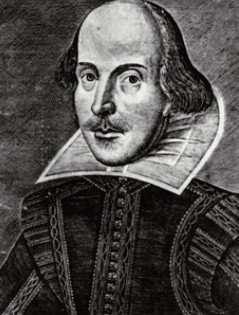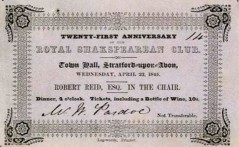  |
|
PROGRAMME DETAILS FOR THE 187TH SEASON 2010/2011
TUESDAY 14 SEPTEMBER 2010
DR ABIGAIL ROKISON
Lecturer in English and Drama, University of Cambridge; Chair of the British Shakespeare Association
Abigail Rokison began her career as a professional actor, training at LAMDA. Her acting work includes numerous roles in Classical theatre, and, amongst other television roles, Primrose Larkin in TV's The Darling Buds of May. Following a degree with the Open University, undertaken whilst acting, she went on to take an MA in 'Shakespeare: Text and Playhouse' at the Globe Theatre/ King's College London. She completed her PhD in Shakespeare in the English faculty at Cambridge University in 2006, after which she became lecturer in Drama and English in the Education Faculty in Cambridge, and Director of Studies in English and Drama at Homerton College, Cambridge. Abigail's monograph, Shakespearean Verse Speaking, was published by Cambridge University Press in 2010. She has also contributed chapters to Shakespeare in Stages (CUP) and The Children's Literature Handbook (Routledge), transcriptions to the Malone Society Collections (MUP) and articles to the journals Shakespeare (Routledge), The New Review of Children's Literature and Librarianship and Literature Compass. Abigail is currently working on a book about Adaptations and Re-workings of Shakespeare for Children and Young Adults for Continuum.
Shakespearean Verse Speaking
Abigail Rokison will speak on the subject of her recently published book; Shakespearean Verse Speaking. Her book explores, and frequently challenges theatrical approaches to Shakespearean verse speaking published in theatrical handbooks and put into practice in rehearsal rooms and drama school training over the last twenty years. It looks at the influence of editorial decisions on theatrical delivery, advocating a greater understanding between actors and editors of the way in which each constituency approaches the Shakespearean text. The book includes suggestions for the creation of a special 'theatrical' text, which makes clear the metrical structure of a scene, whilst indicating areas of ambiguous lineation.
Lecture Notes
The 855th meeting of the Shakespeare Club took place in the Wolfson Hall at the Shakespeare Centre on 14 September 2010. The Chairman for the first meeting of the 2010/11 season, Dr James Stredder, welcomed Dr Abigail Rokison from Homerton College, University of Cambridge. Dr Rokison’s talk was entitled: ‘Shakespearean Verse-speaking’, based on her recently published book with the same title.
Dr Rokison brought a dual perspective to the subject as she is both a professional actor and an academic. She began with a review of recent publications on verse-speaking, including those by Peter Hall, John Barton, Patsy Rodenburg, Cicely Berry, Declan Donnellan, that argued that actors could and should identify clues to the interpretation and delivery of Shakespeare’s words in his verse. This came at a time of increasing emphasis on verse-speaking away from stage spectacle, partly influenced by Shakespeare’s Globe and the search for authenticity in Shakespeare production. Dr Rokison challenged the idea that verse-speaking could be reduced to a set of rules, for example that the First Folio was the only authentic text for actors, and illustrated the effect of two schools of thought, using the guidance of line endings and short verse lines, on the speaking and interpretation of a number of speeches. She traced the genealogy of these ideas back to William Poel, an early 20th century proponent of Elizabethan staging and speaking, through two lines: via George Rylands and the Marlowe Society that influenced the Cambridge-educated directors, Hall and Barton, and from Elsie Fogerty at the Central School of Speech and Drama to Berry and Rodenburg. Dr Rokison concluded that there was a need for more dialogue between actors and academics: that actors should be more aware of the historical context in which Shakespeare’s texts were performed and printed; that academics should be alert to the practical requirements of the theatre.
After questions and a vote of thanks, the meeting ended at 9.15pm
CLICK TO GO BACK TO MAIN PROGRAMME LIST
|




